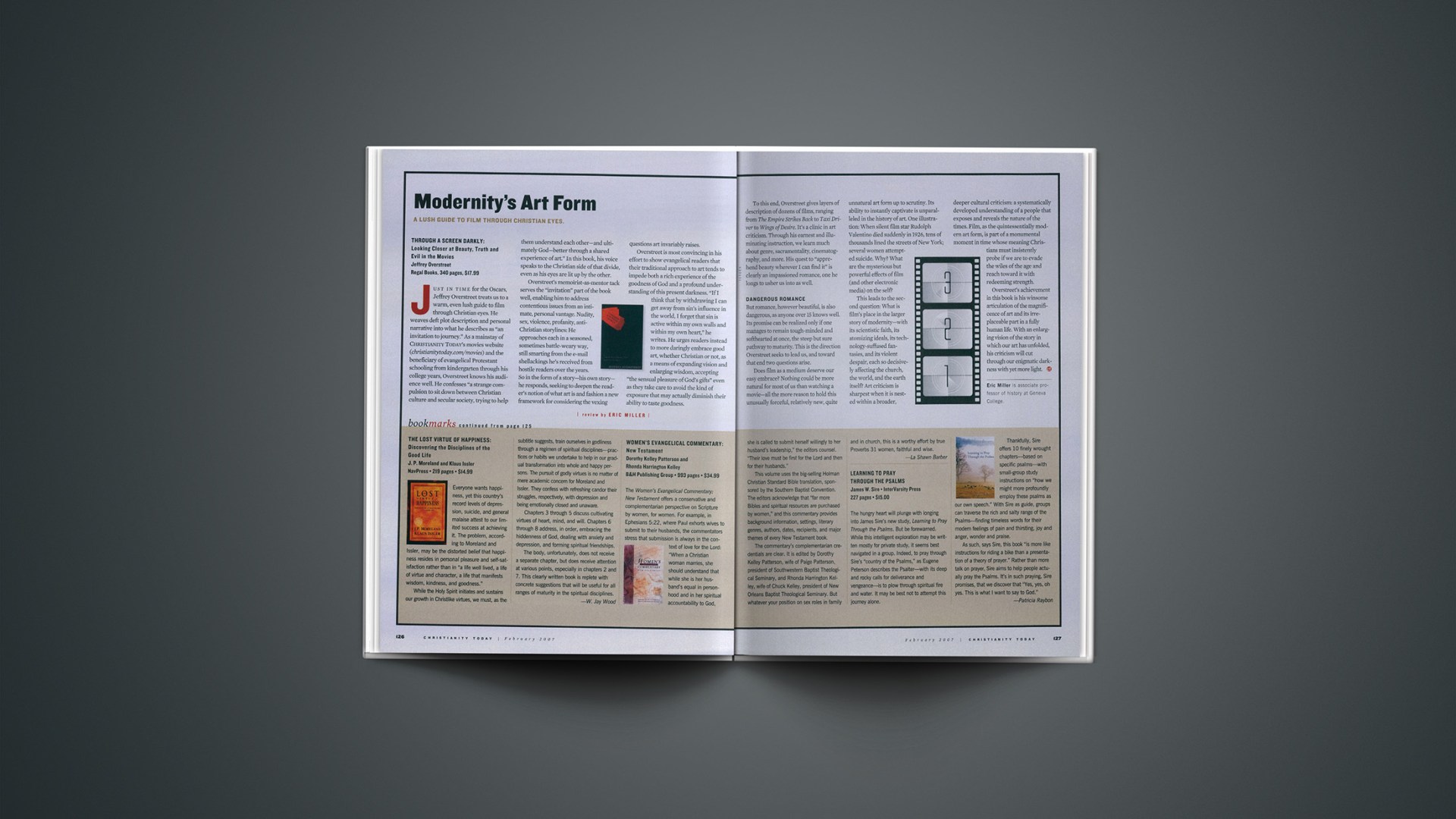Through a Screen Darkly:Looking Closer at Beauty, Truth and Evil in the Moviesby Jeffrey OverstreetRegal Books, 340 pages, $17.99
Just in time for the Oscars, Jeffrey Overstreet treats us to a warm, even lush guide to film through Christian eyes. He weaves deft plot description and personal narrative into what he describes as “an invitation to journey.” As a mainstay of Christianity Today‘s movies website (christianitytoday.com/movies) and the beneficiary of evangelical Protestant schooling from kindergarten through his college years, Overstreet knows his audience well. He confesses “a strange compulsion to sit down between Christian culture and secular society, trying to help them understand each other—and ultimately God—better through a shared experience of art.” In this book, his voice speaks to the Christian side of that divide, even as his eyes are lit up by the other.
Overstreet’s memoirist-as-mentor tack serves the “invitation” part of the book well, enabling him to address contentious issues from an intimate, personal vantage. Nudity, sex, violence, profanity, anti-Christian storylines: He approaches each in a seasoned, sometimes battle-weary way, still smarting from the e-mail shellackings he’s received from hostile readers over the years. So in the form of a story—his own story—he responds, seeking to deepen the reader’s notion of what art is and fashion a new framework for considering the vexing questions art invariably raises.
Overstreet is most convincing in his effort to show evangelical readers that their traditional approach to art tends to impede both a rich experience of the goodness of God and a profound understanding of this present darkness. “If I think that by withdrawing I can get away from sin’s influence in the world, I forget that sin is active within my own walls and within my own heart,” he writes. He urges readers instead to more daringly embrace good art, whether Christian or not, as a means of expanding vision and enlarging wisdom, accepting “the sensual pleasure of God’s gifts” even as they take care to avoid the kind of exposure that may actually diminish their ability to taste goodness.
To this end, Overstreet gives layers of description of dozens of films, ranging from The Empire Strikes Back to Taxi Driver to Wings of Desire. It’s a clinic in art criticism. Through his earnest and illuminating instruction, we learn much about genre, sacramentality, cinematography, and more. His quest to “apprehend beauty wherever I can find it” is clearly an impassioned romance, one he longs to usher us into as well.
Dangerous Romance
But romance, however beautiful, is also dangerous, as anyone over 15 knows well. Its promise can be realized only if one manages to remain tough-minded and softhearted at once, the steep but sure pathway to maturity. This is the direction Overstreet seeks to lead us, and toward that end two questions arise.
Does film as a medium deserve our easy embrace? Nothing could be more natural for most of us than watching a movie—all the more reason to hold this unusually forceful, relatively new, quite unnatural art form up to scrutiny. Its ability to instantly captivate is unparalleled in the history of art. One illustration: When silent film star Rudolph Valentino died suddenly in 1926, tens of thousands lined the streets of New York; several women attempted suicide. Why? What are the mysterious but powerful effects of film (and other electronic media) on the self?
This leads to the second question: What is film’s place in the larger story of modernity—with its scientistic faith, its atomizing ideals, its technology-suffused fantasies, and its violent despair, each so decisively affecting the church, the world, and the earth itself? Art criticism is sharpest when it is nested within a broader, deeper cultural criticism: a systematically developed understanding of a people that exposes and reveals the nature of the times. Film, as the quintessentially modern art form, is part of a monumental moment in time whose meaning Christians must insistently probe if we are to evade the wiles of the age and reach toward it with redeeming strength.
Overstreet’s achievement in this book is his winsome articulation of the magnificence of art and its irreplaceable part in a fully human life. With an enlarging vision of the story in which our art has unfolded, his criticism will cut through our enigmatic darkness with yet more light.
Eric Miller is associate professor of history at Geneva College.
Copyright © 2007 Christianity Today. Click for reprint information.










